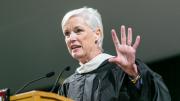Abortion-rights activist Cecile Richards’s Convocation speech at the Harvard T.H. Chan School of Public Health (HSPH) on Wednesday could not have been more timely. “Like most folks working in healthcare, we really did operate under the assumption that forward progress is practically inevitable,” said the former president of the Planned Parenthood Federation of America. “But yesterday, we learned that for the first time since the Roe v. Wade decision 46 years ago, an entire state is facing the fact that they will likely no longer have access to safe and legal abortion.
“The state of Missouri already has restrictions that are so impossible to comply with that there is only one health center remaining that actually provided abortion services. And now the state’s refusing to renew that health center’s license,” she continued. “Which means that starting this weekend, barring a miracle, legal abortion will no longer be available in Missouri….This is an in-real-time reminder that the biggest hurdles you’re going to face, I believe, in getting people the healthcare they deserve will have a lot less to do with our public healthcare system and a lot more to do with our political system. So it’s not just enough anymore to be public-health experts.” The graduates could have done anything with their lives, Richards said, yet they chose public health, “the path of most resistance.”
She praised HSPH dean Michelle Williams’s recent op-ed in The Boston Globe; Williams condemned Alabama’s recent law to ban virtually all abortions, and Georgia’s ban on abortions after six weeks. Richards quoted: “When women don’t control their own reproduction, they don’t control their own health, their economic prospects, or their ability to reach their full potential.” The same legislators have voted against access to birth control and refused to expand Medicaid, which pays for half of births in Alabama, Richards said—and the state ranks fiftieth in the country for infant mortality: “You’d think that would be a good healthcare crisis for this state legislature to actually work on.”
The graduates have a special role in the political battles over people’s access to healthcare and control over their bodies, Richards asserted: “It’s impossible to overstate the importance of people in the public-health community standing up boldly with the people who counted on you. For those who believe that we have the luxury of staying out of politics, we simply don’t. So welcome to the fight.” Her comments echoed those made by Williams earlier in the ceremony: “Public health is more than academics,” the dean said. “It is about activism.…Large-scale change in the environments we live in, the behaviors we practice, the policies that shape our everyday realities, will not happen on its own.”
Richards also urged public-health professionals to run for office. She told the story of Lauren Underwood, an African-American nurse from the Chicago area who ran for Congress last year, and won. Underwood and fellow representative Alma Adams created the first Black Maternal Health Caucus in the House earlier this year. “I hope that every single one of you is thinking about running for office,” Richards said.
Finally, she called on the students to “to build movements across race, across gender, sexual orientation, income—to fight for true healthcare equity in America.”
“We are very near losing the right to safe and legal abortion in America, a right we have had for more than 40 years. But what I wonder is, why it almost exclusively women who carry this battle?” Richards asked. “So, wouldn’t it be awesome if male leaders in public-health schools across America joined Dean Williams and wrote their own op-eds?...Because like all public-health issues, abortion is not a women’s issue. It’s a fundamental issue of the right of people to make their own healthcare decisions—and that affects everyone.”
And public-health advocates need to take racism seriously as a determinant of health, she continued: “Even though I’m incredibly grateful to Congresswoman Underwood, Senator Kamala Harris, and others who are raising the alarm about the crisis of maternal mortality, why does it always have to be African-American women who raise the alarm? We all urgently need to take on racism in this country.” Richards also cited the death of immigrant children at the southern border, and government inaction on gun violence, as urgent public-health crises.
“Since I’ve left Planned Parenthood, I’ve joined with other women across the country…to create a new organization—Supermajority—to build the most powerful multiracial, intergenerational movement for gender equity possible,” Richards said. “Because to me, building this kind of movement is more than a political goal. It’s a public-health imperative….Here at the Chan School, you know that disempowerment—whether it’s political, economic, or social—has profound consequences for public health. We know that people who endure racism have higher rates of chronic disease. People who are financially insecure suffer deaths of despair, caused by alcohol, drugs, or suicide.
“I think it’s time to do more than resist,” she urged. “It’s time to imagine the country we want to live in, and then go build it.”









